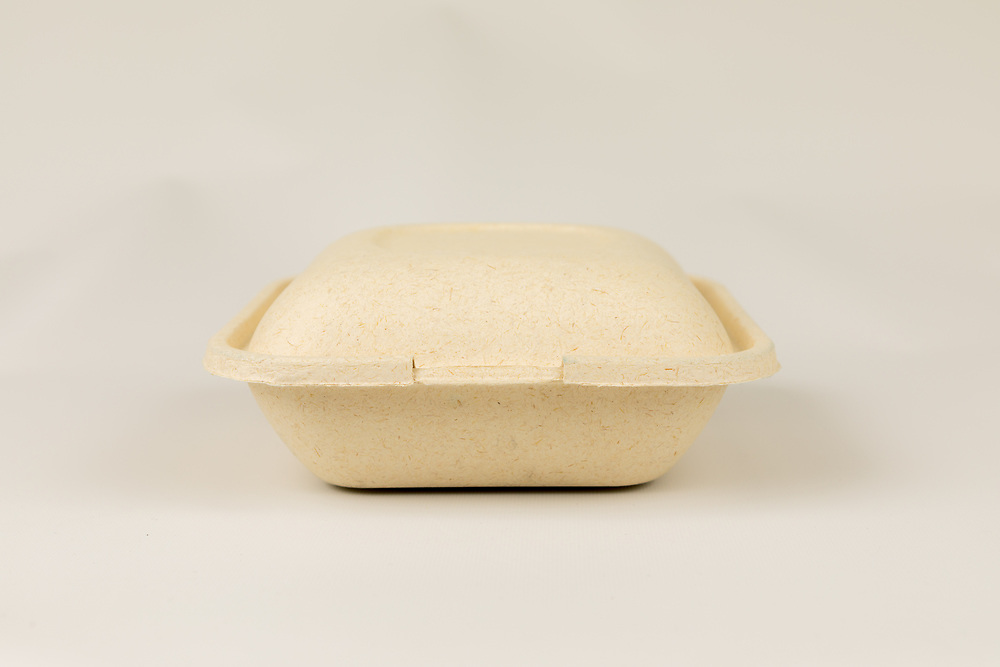UW dining halls look to expand sustainability efforts
In an effort to reduce waste, University Housing Dining and Culinary Services is transitioning to compostable to-go containers and working on connecting with more local food recovery partners.
These are just two of many ways UW’s dining halls are working to become more sustainable.
As the dining halls run out the current to-go containers, they are phasing in new compostable counterparts, including standard to-go containers, cups, condiment containers, utensils and straws.

The most common to-go container is the clamshell to-go container, shown above. Photo by Claire Zettl, Division of University Housing
“In the near future, nearly all to-go food containers in Housing and Dining will be compostable,” University Housing Sustainability and Communication Coordinator Breana Nehls says.
The new items are manufactured by World Centric using compostable plant-based fibers and plastics, meaning all of them are non-polluting and non-toxic. In addition, 25 percent of World Centric’s profits are donated to different environmental organizations to spark even more positive change for the environment.
Nehls says the new effort is in response to student requests to be more sustainable.
“If we’re able to provide [students] with a compostable container, we’re able to decrease our negative environmental impact,” Nehls says.
Beyond the to go container initiative, UW Housing is also actively working on reducing food waste by donating excess food to local food recovery organizations. Right now, UW Housing has three different food recovery partners: the Campus Kitchens Project, the Food Recovery Network and the Open Seat Food Pantry.
“We’re trying to make sure that each of our units are connected with a food recovery partner.”
Breana Nehls
The Campus Kitchens Project collects food and prepares it into meals for food insecure students. The Open Seat Pantry is a food pantry on campus that provides free food for UW–Madison students. The Food Recovery Network collects food and brings it to the Bayview Community Center, the Crossing and the Open Seat — all of which provide free food to low-income community members and/or students.
Four Lakes Market, Gordon Avenue Market and Rheta’s Market are currently donating to the recovery partners. The goal, Nehls says, is to get all of UW’s dining halls participating. Housing is looking to connect with another church on campus that provides daily meals and another community group that collects food and disperses it to the pantries who are in the most need.
“We’re trying to make sure that each of our units are connected with a food recovery partner,” Nehls says. “We’re actively working on that so ideally we could have partnerships made up yet this semester if everything goes as planned.”
One of the biggest barriers in formalizing these partnerships is logistics. Some of the recovery partner organizations are run by students — many of whom don’t have vehicles. Finding ways to get food transported across campus can be challenging, especially for dining halls that are farther away from the heart of campus. For instance, it’s easy for the Open Seat to partner with Gordon Avenue Market because students can walk food from Gordon over to the food pantry in the Student Activities Center.
Another barrier is that what the dining halls can donate varies from day to day. UW Housing can’t always guarantee full meals to the recovery partners because on some days meals in the dining halls sell really well, and there isn’t any excess food left over. Nehls says having variable food amounts can make it hard for organizations to partner with them.
Despite challenges, Nehls says reducing food waste and providing low-income students with options for free food around campus is a top priority.
“We know there’s issues with food security on campus, so we want to help to be a part of that solution,” Nehls says.
Plus, Nehls says reducing food waste and being sustainable is simply “part of being a Badger.” Gordon Avenue Market has a waste oil boiler, which uses recycled vegetable oil to heat water. One gallon of oil heats around 250 gallons of water, Nehls says. All dining halls use an online software to inventory their items, calculate the amount of food needed for production and only order the food they need. This “controls waste on the front end,” Nehls says.
And in addition to their sustainability initiatives, Housing Dining also works to educate residents and customers about options for being more sustainable.
“It’s really [about] responding to our residents’ needs,” Nehls says. “They’re asking for us to have more sustainable practices, so we hear that and we try to react accordingly to be as sustainable as we’re able.”



